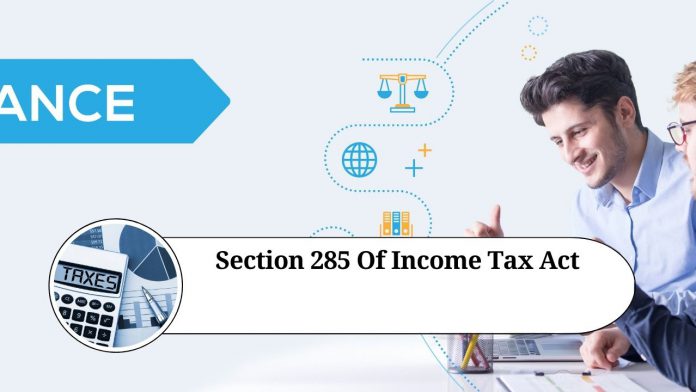The Income Tax Act of India is a comprehensive legislation that governs the taxation of income generated within the country. It contains various provisions that specify the rules and regulations for taxpayers to comply with. One such provision is Section 285 of the Income Tax Act, which deals with the disclosure of information by banks.
Overview of Section 285
Section 285 of the Income Tax Act mandates that banks and other financial institutions disclose certain information to the income tax authorities. The provision applies to all banks, including cooperative banks, and other financial institutions such as post offices, insurance companies, and mutual funds.
Information to be disclosed under Section 285
Section 285 requires banks and other financial institutions to provide information on the accounts held by their customers. This includes the name and address of the account holder, the account number, the opening and closing balance of the account, and the interest earned on the account.
In addition, the provision requires banks to disclose information on any transaction that exceeds a specified threshold. This threshold is determined by the Central Board of Direct Taxes (CBDT) and is subject to change from time to time. The purpose of this provision is to identify cases of tax evasion or undisclosed income.
Exceptions to Section 285
There are certain exceptions to Section 285. For example, banks are not required to disclose information on dormant accounts. A dormant account is an account that has not been used for a certain period, usually more than 12 months. In addition, banks are not required to disclose information on accounts held by the government or by foreign diplomatic missions.
Penalties for non-compliance
Banks that fail to comply with the provisions of Section 285 may face penalties. The penalty for non-compliance can be up to Rs. 1 lakh, and it can be imposed for each failure to comply with the provision.
Significance of Section 285
Section 285 is an important provision in the Income Tax Act as it helps the income tax authorities to identify cases of tax evasion and undisclosed income. By requiring banks to disclose information on their customers’ accounts, the provision provides the authorities with a valuable tool to detect instances of tax evasion and money laundering.
In addition, Section 285 helps to ensure that taxpayers are paying their fair share of taxes. It helps to prevent tax evasion by making it more difficult for taxpayers to conceal their income from the authorities.
Conclusion:
Section 285 of the Income Tax Act is a crucial provision that helps to ensure transparency and accountability in the banking system. It requires banks and other financial institutions to disclose information on their customer’s accounts, which helps the income tax authorities to detect instances of tax evasion and undisclosed income. Compliance with this provision is essential for banks to avoid penalties and maintain their reputation as responsible and law-abiding institutions.
Read more useful content:
- section 145 of income tax act
- section 10e of income tax act
- section 9 of the income tax act
- section 94b of income tax act
- section 206aa of income tax act
Frequently Asked Questions:
Q: What is Section 285 of the Income Tax Act?
A: Section 285 of the Income Tax Act is a provision that requires banks and other financial institutions to disclose certain information to the income tax authorities. The provision applies to all banks and financial institutions, including cooperative banks, post offices, insurance companies, and mutual funds.
Q: What information is required to be disclosed under Section 285?
A: Section 285 requires banks and financial institutions to provide information on the accounts held by their customers. This includes the name and address of the account holder, the account number, the opening and closing balance of the account, and the interest earned on the account. In addition, banks are required to disclose information on any transaction that exceeds a specified threshold.
Q: What is the threshold for transaction disclosure under Section 285?
A: The threshold for transaction disclosure under Section 285 is determined by the Central Board of Direct Taxes (CBDT) and is subject to change from time to time. Banks are required to disclose information on any transaction that exceeds the specified threshold.
Q: Are there any exceptions to Section 285?
A: Yes, there are certain exceptions to Section 285. For example, banks are not required to disclose information on dormant accounts or accounts held by the government or by foreign diplomatic missions.
Q: What happens if a bank fails to comply with Section 285?
A: Banks that fail to comply with the provisions of Section 285 may face penalties. The penalty for non-compliance can be up to Rs. 1 lakh, and it can be imposed for each failure to comply with the provision.
Q: Why is Section 285 important?
A: Section 285 is an important provision in the Income Tax Act as it helps the income tax authorities to identify cases of tax evasion and undisclosed income. By requiring banks to disclose information on their customers’ accounts, the provision provides the authorities with a valuable tool to detect instances of tax evasion and money laundering.
Q: How can taxpayers ensure compliance with Section 285?
A: Taxpayers can ensure compliance with Section 285 by ensuring that their bank accounts and transactions are fully disclosed to the income tax authorities. Taxpayers should also ensure that they maintain accurate and up-to-date records of their financial transactions. In addition, taxpayers should seek the advice of a qualified tax professional to ensure that they are fully compliant with all applicable tax laws and regulations.




















